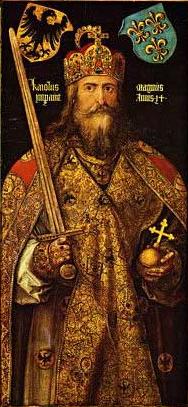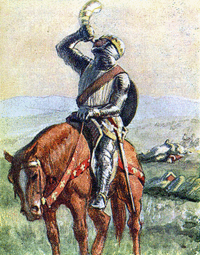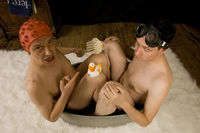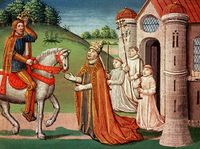Charlemagne
- Charlemagne était empereur des Romains et roi parmi les Francs saliens. C'était le fils de Pépé de Peu.
| Charlemagne ("the K3WL") | |
|---|---|
| King of the Franks, Holy Roman Emperor | |
 Charlemagne, preparing for battle. Left hand: Sovereign's Orb. Right hand: Looks like sword, but scientists disagree about the use of this particular subject. | |
| Reign | 768 - 814 |
| Predecessor | None, Holy Roman Emperor was an entirely original title! |
| Successor | Squabbling siblings |
| Consort | some lucky ladies and faggots |
| Issue | IP issues with the Byzantine Empire |
| Father | Pepe le Peu |
| Mother | A Cat, or something |
“Holy Roman Emperor, Batman!”
– Robin on Charlemagne
Charlemagne (also known as Charles Le Mange for his nasty skin condition) was King of the Franks, King of the Lombards and Holy Roman Emperor between 768-814. He has a prize named after him by the European Union for 'fostering greater understanding at a time when everything was pretty dark'. He is regarded as a hero to the French, a mighty Teutonic warrior for the Germans and...a big fat 'Who He?' for everyone in Great Britain. Charlemagne was also a professional ice skater, he is known in Belgium for his performance in the ice skating show-off Empire on Ice in Peer in 802
Charlemagne was a fluent speaker of many languages, he could read (apparently) but was unable to write his name. His scrawled a marriage proposal to Empress Irene in Constantinople that was so bad it left that court in a fit of giggles for an entire month. When he was turned down, Charlemagne didn't understand the rejection note so honour was saved all round. Perhaps it was all for show as he had a well stocked collection of concubines to console him.
Origins[edit | edit source]

Charlemagne - or just 'Charles' as he was known before he changed it, was in France in about 742 A.D. to Pepin the Short, Lord Mayor of 'Francia'. How short Pepin was when the average height for Europeans was 5 feet suggests he was in fact a midget. This was strange considering his father, the soldier general Charles Martel was said to have been 7 feet tall in his woolly socks and indeed Charlemagne himself was said to be well over 6 feet too. Anyway, Charlemagne's father was a shorty but evidently one with some tricky-clever ideas. He was a 'Frankenweenie'.
At this historical point, Charlemagne wasn't even a prince or the heir to a throne. Pepin had all the actual power like former American Vice President Dick Cheney but the man who was supposed to be king was 'Dubya' Childeric III. Pepin was reluctant to move against the useless Childeric for sound religious reasons. As anyone who has read their Authorised Dan Brown, Childeric was the direct blood descendant of Jesus Christ and Mary Magdelene. To therefore depose Childeric would require some other reason.
Youth[edit | edit source]
Now royal prince, Charlemagne enjoyed a full and Frank teenager experience. This involved a lot of hunting and brawling, followed by extensive drinking. When drunk Charlemagne became terrifying in his rages and would often demolish walls and break the hands of his servants. Though a devout Christian (in his own eyes), Charlemagne understood he had a lot license with the opposite sex. In his long life he would go through a lot of wives and countless concubines. Church figures sort of let that all past as they saw Charlemagne as their essential champion against pagans, Muslims and above all, those tricksy Byzantines. In Italy the Popes had additionally extracted an insurance scheme where they paid for protection from their enemies by granting the Franks extensive acquisition rights in the rest of Europe.
In 768 Pepin the Short died. His enemies suggested the Mini Monarch drowned in a puddle whilst walking his dogs. The Franks then proclaimed Charlemagne and his brother Carloman kings. This was a standard practise amongst the Franks - and indeed, Charlemagne would do this himself with his own family.
War and the Death of Roly-Poly[edit | edit source]
Charlemagne's first business was to remove his brother Carloman. In the division of Pepin's kingdom, Charlemagne got the wet and muddy north around Paris whilst Carloman got the nice sunny south. Charlemagne complained to his mother Bertrada that his brother was a lazy sod. In 771 news got out that Carloman had suddenly died drinking cocktails on the verandah of his palace. Charlemagne seized his brother's lands and sent Carloman's wife and sons to religious houses where they simply disappeared off the historical record.
Now he was on a roll, Charlemagne chose to fight the Lombards in Italy and overthrew them too. He was rewarded with a grand party by Pope Hadrian. Next Charlemage was urged to fight the Muslims. This meant an invasion of Spain. Charlemagne chose his old friend Roland (Orlando in Italian) to battle with the Arabs. Roland was a poet and could blow a trumpet which appear to have been unrelated attributes.
The Franks crossed the Pyrenees and advanced towards Barcelona. However Charlemagne chose to leave as he just remembered he was due for a campaign against the Saxons in Northern Germany. Roland said he would 'tidy up' and follow. But his rearguard was surprised on their way back in a valley by an army of saracens. Legends said it was treachery by another Frank called Ganelon who was jealous of Roland and his mighty horn. Roland was killed but before he died, he played a trumpet solo until run through by an unappreciative audience.
Urge to Convert[edit | edit source]
The loss of his friend persuaded Charlemagne that he had to make amends and kill some new people. He decided to pick on the Saxons. Unlike the ones who had crossed over to England and were now christians, their German relatives were still followers of Woden and human sacrifice. Charlemagne didn't like pagans on his frontiers and embarked on a war to persuade the Saxons to abandon their old gods and adopt Christianity.
This 'persuasion' involved a lot of sword swinging and killing of the truculent Saxons but eventually Charlemagne prevailed. The Saxon leaders were gathered together in hosed down in a mass baptism in 785. The church then moved in and under his protection, carried on the task of converting the Germans. Most didn't understand what on earth this Christianity business was all about but when you got a giant standing over ready to bash your brains, you would indeed convert.
Theology[edit | edit source]
By the 790s and with a long history of campaigning, Charlemagne decided to catch up on his reading. Well, being read too. He chose to brush up his theology. As he understood it, this subject was something the Greeks loved to talk about. The Byzantine Empire had under previous emperors like Leo the Iconoclast and Constantine V (Shitty Water) had developed the idea that Christianity shouldn't have icons. They were more into text like instructions for the religious studies. The Papacy said this was wrong and Charlemagne went along with that. Still, even for a Frankish conqueror, he respected the Byzantines as they were supposed to be legitimate inheritors of the Roman Empire and had recently gone back to icons in 787 when someone had tried to delete all imperial edicts.
But in Rome they saw things a bit different. The situation changed in 797 when emperor Constantine VI had his eyes pulled out by his mother Irene for his wish to rule alone and banish his mother from his bedroom. The new Pope Leo III said that was a 'bit harsh' but agreed it was the right thing to do. He was more offended when Irene chose to remain empress without the benefit/encumbrance of a husband. Christianity without an emperor didn't seem like a good idea to Leo.
Charlemagne was now living in Aachen in Germany. This ancient Roman frontier city had a spa and bathing facilities. Charlemagne may have been illiterate but he appreciated a good bath. It was there he got the news about a 'vacancy' in Rome and set off to see what was going on.
Surprise![edit | edit source]
Charlemagne arrived in Rome in December 800. He wanted to see Pope Leo but his Holiness told him to come over to St.Peter's on Christmas day for a 'light intimate lunch with just a few friends'. The mighty Frank hung around the city for awhile, visiting any tourist attraction that was still standing after 300 years of active neglect.
Finally Charlemagne was told to arrive. Pope Leo told him to 'dress regally' and so Charlemagne came to St.Peter's in his Frankish clothes. Leo told him to walk towards the altar and pray to St.Peter. Charlemagne walked down the center aisle and knelt down on his knees. Just then he felt something on his head and suddenly the church was filled with music and cheers. Reaching up to head, Charlemagne discovered a crown, it's price tag still attached and the legend "Made in Italy" written in Latin around the edge.
Pope Leo embraced Charlemagne and said Welcome to Rome, my emperor."
Holy Roman Emperor[edit | edit source]

Charlemagne liked his new status as emperor - though he should have read the small print that came with the honour ("what the Pope Giveth, He Can Taketh As well") but then..Charlemagne couldn't really read. But a crown is a crown and Charlemagne liked to wear his honour in bed, in the bath or when he was on the job. In return he gave the pope a wooden stick with a cross on top and a satsuma.
The new era was called the "Carolingian Renaissance" and saw a lot of furious manuscript copying in windy monasteries. Because paper was in short supply, a lot of ancient classics were finally lost in this time period because they were not judged 'funny' enough. So during this time many Greek and Roman classics were lost for ever. Works by Plato Ancient Jokes for Ancient Times, the Queen Cleopatra Guide to Handling Snakes and Ovid's "Pagan Sex Manual" were lost.
It was also during this time that Charlemagne adopted 'English time'. This was a method of working out birthdays and when to pay your bills as devised by the Venerable Bede. Charlemage wanted to call it 'Charlie Time' but instead became known as Anne Diamond Time or 'Anno Domini ' in Latin. Before then people were using various calendars so if you wrote to a friend 'see you next year'..it all depended if you were setting your clock in the correct religious time zone.
As a man[edit | edit source]
Charlemagne was known as a menacing and brutal warlord. He proved an adroit military tactitian of the "French" forces. Inspiring his troops and charismatically leading the charge, he perfected the technique of turning tail. If backed into a corner, his soldiers more than rose to the occasion under his leadership. Rather than cower upon the ground in the manner of the common sissy, they implemented the technique of dropping weapons and raising both arms in a single fluid motion. Despite this astounding methodology, his wife left him for an elderly blind cripple she claimed was seven times the man he was. What hogwash- the cripple was eight times the man he was.
As a Musician[edit | edit source]
Charlemagne developed Carolingian Heavy Christian Metal to compensate for his wife's infidelity. It was popular amongst monks who would change their habits to various leather ensembles to appreciate the music more.
For centuries these works were judged lost or used as loo paper by subsequent Holy Roman Emperors. However a huge cache of documents were found recently and played as the new European Anthem as Beethoven's Ode to Joy is considered too 'stuffy' by younger people. The recovered work is now performed by Christopher Lee as he is one of the few survivors to date from that time period.
Byzantine Reaction[edit | edit source]
The Greeks in Constantinople thought Charlemagne receiving an imperial crown a huge Papal joke. They laughed more when Charlemagne followed that with an apparent genuine request to marry Irene. He had seen her image and thought it was time her married into some class. Irene's court eunuchs thought she would turn Charlemagne down flat. But when she asked for a portrait of her suitor and openly admired his manly look (though Charlemagne was nearly 60 and going grey), she was deposed and sent to a nunnery for punishment. Her replacement Emperor Nicephorus I wrote to Pope Leo and asked if the next 'Frankish emperor' would be dog.
Charlemagne understood that insult and declared war. The two sides carried on a haphazard conflict until Nicephorus was killed and his head scooped out to be made into a drinking cup by the Bulgarian King, Krum the Cranial. Charlemagne said it was God's will and Nicephorus's successor Michael wrote to him with a letter that started 'Dear Caesar Augustus Carolus'. So pleased was Charlemagne with this letter that he framed it his Aachen palace. Years later it was discovered what everything thought was ink on paper was in fact dried shit. Oh well.
Death[edit | edit source]
Charlemagne died at the age of 109 (so he said, he wasn't good at maths either). His son and successor emperor Louis buried his father in Aachen as per an unusual bequest.
Scared about being buried in dirt, Charlemagne was mummified and preserved astride a horse, rearing up upon its hind legs, a sword at his side and a pike in his fist. Fantastically standing to either side were some of Charlemagne's court - excess bureaucrats, quill pushers and flunkies. Some had died before him but others were there for love of their Charlie.
See Also[edit | edit source]








